英语语法主语+及物动词+宾语+宾补介绍
主语+及物动词+宾语+宾补举例
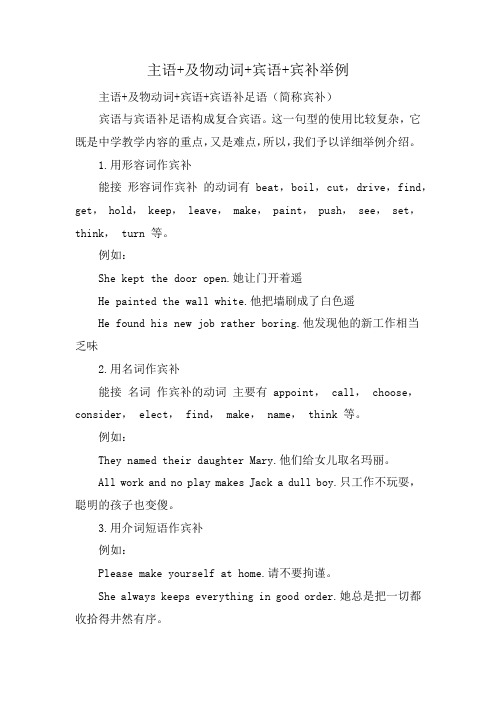
主语+及物动词+宾语+宾补举例主语+及物动词+宾语+宾语补足语(简称宾补)宾语与宾语补足语构成复合宾语。
这一句型的使用比较复杂,它既是中学教学内容的重点,又是难点,所以,我们予以详细举例介绍。
1.用形容词作宾补能接形容词作宾补的动词有 beat, boil, cut, drive, find,get, hold, keep, leave, make, paint, push, see, set,think, turn 等。
例如:She kept the door open.她让门开着遥He painted the wall white.他把墙刷成了白色遥He found his new job rather boring.他发现他的新工作相当乏味2.用名词作宾补能接名词作宾补的动词主要有 appoint, call, choose,consider, elect, find, make, name, think 等。
例如:They named their daughter Mary.他们给女儿取名玛丽。
All work and no play makes Jack a dull boy.只工作不玩耍,聪明的孩子也变傻。
3.用介词短语作宾补例如:Please make yourself at home.请不要拘谨。
She always keeps everything in good order.她总是把一切都收拾得井然有序。
I found her in better spirits when we met again.再见面时,我发现她的情绪好多了。
4.用副词作宾补例如:Don`t leave mebehind.别把我落下。
I won`t let youdown.我不会让你失望的。
Who will drive mehome? 谁开车把我送回家?5.用带to的不定式作宾补能接带to的不定式作宾补的动词主要有 advise, allow, ask,beg, cause, choose, encourage, expect, force, get, hate,invite, like, love, order,permit, persuade, prefer, request, teach, tell, want,warn, wish 等。
英语主谓宾精解
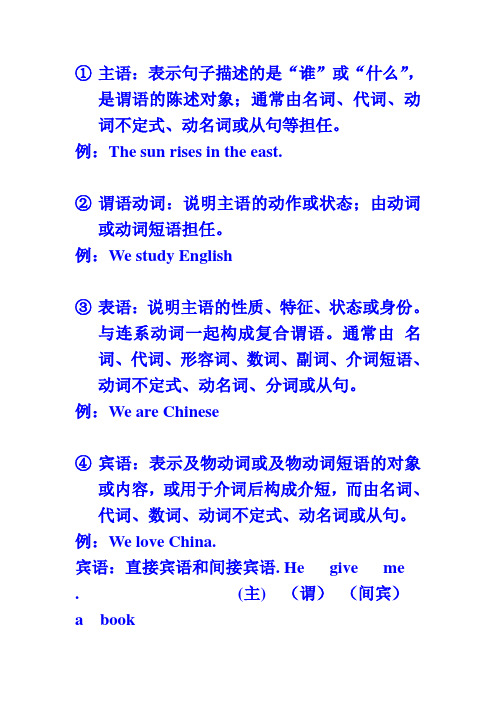
①主语:表示句子描述的是“谁”或“什么”,是谓语的陈述对象;通常由名词、代词、动词不定式、动名词或从句等担任。
例:The sun rises in the east.②谓语动词:说明主语的动作或状态;由动词或动词短语担任。
例:We study English③表语:说明主语的性质、特征、状态或身份。
与连系动词一起构成复合谓语。
通常由名词、代词、形容词、数词、副词、介词短语、动词不定式、动名词、分词或从句。
例:We are Chinese④宾语:表示及物动词或及物动词短语的对象或内容,或用于介词后构成介短,而由名词、代词、数词、动词不定式、动名词或从句。
例:We love China.宾语:直接宾语和间接宾语. He give me. (主) (谓)(间宾)a book(直宾)⑤定语:修饰或跟定名词或代词用的。
由adj、代词、数词、介词短语、动词不定式、动名词、分词或从句。
例:This is difficult problem.⑥补语:补语说明主语或宾语用的。
通常由adj、n、代词、数词。
例:We elected him monitorHe was elected monitor我们选他为班长⑦状语:修饰动词、形容词、副词或整个句子用的。
通常由副词,介词短语,动词不定式,分词或从句。
He run fast.⑧同位语:对前面的名词或代词做进一步解释。
由名词、代词、数词或从句例:This is Mr.zhou.our headmaster⑨插入语:对一句话对做一些附加的解释。
由形容词、副词、介词短语、动词不定式、现在分词或从句担任。
例:To be frank ,Idon’t like quite agree with you.坦白的说……。
7 基本句型四 主语+及物动词+宾语+宾补

主语+及物动词+宾语+宾补
.
1
本句型中的动词虽然是及物动词,但是只 跟宾语还不能表达完整的意思,必须加上一个 补充成分,如形容词、名词、副词(仅限少数 几个)、动词不定式、分词来补充说明宾语, 才能表达一个完整的意思。宾语和宾语补足 语在意义有一种逻辑上的主谓关系,即宾语与 宾语补足语在“意义上”是一种主谓关系。 如:
.
12
6. 主语 + 谓语 + it + 宾补 + 真正宾
语。如:
⑴ I found it very pleasant to be with your family. 我觉得与你家人
相处令人愉快。
.
13
⑵ She thinks it no point practicing so much. 她认为练习这么多没有意义。
要带to。如:
The boss made him work overtime.(主动 语态)
He was made to work overtime.(被动语态)
老板叫他加班。
.
10
5. 主语+及物动词+宾语+分词。如: Don’t leave the water running after you have washed your hands. 洗手之后不要 听任水白流。
15. I believe it no use talking with that
man.
.
21
此课件下载可自行编辑修改,此课件供参考! 部分内容来源于网络,如有侵权请与我联系删除!
there by ship.
.
20
14. 学校定了一条规则, 开始上课时学 生要起立。(make) 14. The schools made it a rule that students should stand up at the beginning of the class.
什么是主语、谓语、宾语、宾补、状语、定语

什么是主语、谓语、宾语、宾补、状语、定语什么是主语、谓语、宾语、宾补、状语、定语?什么是主语、谓语、宾语、宾补、状语、定语?主语是一个句子中所要表达,描述的人或物,是句子叙述的主体。
可由名词、代词、数词、名词化的形容词、不定式、动名词和主语从句等来承担。
谓语是用来说明主语做了什么动作或处在什么状态。
谓语可以由动词来担任,一般放在主语的后面。
宾语是动作的对象或承受者,常位于及物动词或介词后面。
宾语可由名词、代词、数词、名词化的形容词、不定式、动名词、宾语从句等来担任。
定语:用于描述名词,代词,短语或从句的性质,特征范围等情况的词叫做定语, 定语可以由名词,形容词和起名词和形容词作用的词,短语担任。
如果定语是单个词,定语放在被修饰词的前面,如果是词组,定语放在被修饰词的后面。
状语:说明事物发生的时间,地点,原因,目的,结果方式, 条件或伴随情况,程度等情况的词叫状语。
状语可以由副词, 短语以及从句来担任。
补语是述补结构中补充说明述语的结果、程度、趋向、可能、状态、数量等的成分。
补语与述语之间是补充与被补充、说明与被说明的关系,是补充说明动词或形容词性中心语的,可以回答“怎么样”、“多少次”、“何处”、“何时”、“什么结果”等问题。
补语都放在中心语后头,除了趋向动词、数量词、介宾结构和一部分形容词可以直接作补语外。
补语多用形容词、数量词、趋向动词、介宾结构来担任,各种关系的词组也常作补语。
口诀:主谓宾、定状补,主干枝叶分清楚。
定语必居主宾前,谓前为状谓后补。
状语有时位主前,逗号分开心有数。
状语状语是修饰限制谓语的成分。
副词的主要功能是作状语,形容词性词组、时间名词、方位词、能愿动词、介宾词组也经常作状语。
状语也可以分为描写性的和限制性的。
多项状语的排列词序离中心语从远及近一般为:表示时间的名词、副词、方位词组、介宾词组;表示处所的介宾词组、方位词组、名词、代词;表示语气、关联的副词;表示条件、方式、范围、目的、对象、关涉的介宾词组和副词;表示情态的形容词、动词。
如何正确区分主语、谓语、宾语、定语、状语、补充语
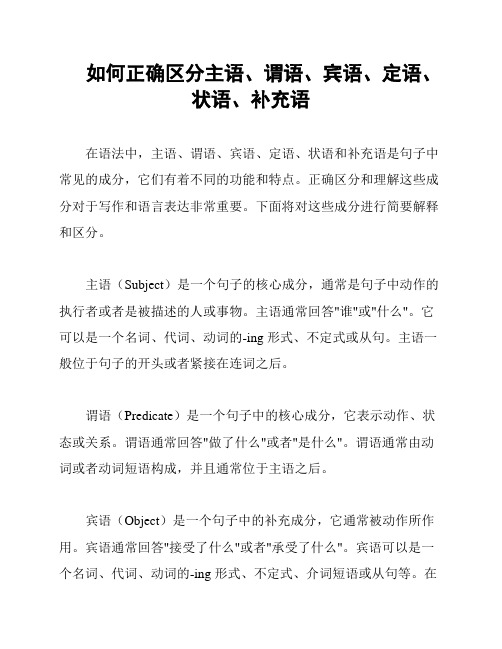
如何正确区分主语、谓语、宾语、定语、状语、补充语在语法中,主语、谓语、宾语、定语、状语和补充语是句子中常见的成分,它们有着不同的功能和特点。
正确区分和理解这些成分对于写作和语言表达非常重要。
下面将对这些成分进行简要解释和区分。
主语(Subject)是一个句子的核心成分,通常是句子中动作的执行者或者是被描述的人或事物。
主语通常回答"谁"或"什么"。
它可以是一个名词、代词、动词的-ing 形式、不定式或从句。
主语一般位于句子的开头或者紧接在连词之后。
谓语(Predicate)是一个句子中的核心成分,它表示动作、状态或关系。
谓语通常回答"做了什么"或者"是什么"。
谓语通常由动词或者动词短语构成,并且通常位于主语之后。
宾语(Object)是一个句子中的补充成分,它通常被动作所作用。
宾语通常回答"接受了什么"或者"承受了什么"。
宾语可以是一个名词、代词、动词的-ing 形式、不定式、介词短语或从句等。
在及物动词后面通常会有一个直接宾语,而有些及物动词后面还会有一个间接宾语。
定语(Adjective)是一个句子中的修饰成分,用来描述或限制名词或代词的特点和性质。
定语可以是一个形容词、代词、数字、名词化的形容词短语或从句等。
定语通常位于被修饰的名词之前。
状语(Adverbial)是一个句子中的状态成分,用来表示动作发生的时间、地点、方式、原因等信息。
状语可以是一个副词、介词短语、动词的-ing 形式、不定式短语、副词从句等。
状语可以出现在句子的开头、中间或结尾。
正确区分和使用主语、谓语、宾语、定语、状语和补充语对于准确表达和良好的语言表达非常重要。
通过深入理解每个成分的功能和特点,我们可以更好地进行写作和语言交流。
英语语法主语+及物动词+宾语+宾语补语

英语语法主语+及物动词+宾语+宾语补语
英语语法主语+及物动词+宾语+宾
语补语
主语(S)+及物动词(Vt)+宾语(即受词,下同)(O)+ 宾语补语(OC) (上)
音频要点:
及物动词后面跟宾语和宾补,比如:
Push the door open. 把门推开。
I'd like my coffee black. 我的咖啡不加奶精和糖。
除形容词修饰宾语外,名词也可以作为宾补。
比如:
I believe him an honest man. 我相信他是个诚实的人。
I consider them my good friends. 我视他们为我的好朋友。
分词修饰宾语,比如:
I'm sorry to keep you waiting so long. 抱歉让你久等。
I found my dad falling asleep on the sofa.我发现我爸爸在沙发上睡着了。
The smoke started me coughing. 烟呛得我咳嗽起来。
He had his car towed away this morning. 他的车今早被拖吊。
He had his wallet picked on the bus. 他的皮夹在公交车上被扒了。
句子成分:主语、谓语、宾语、表语、定语、宾语补足语和状语 高考英语语法重点归纳
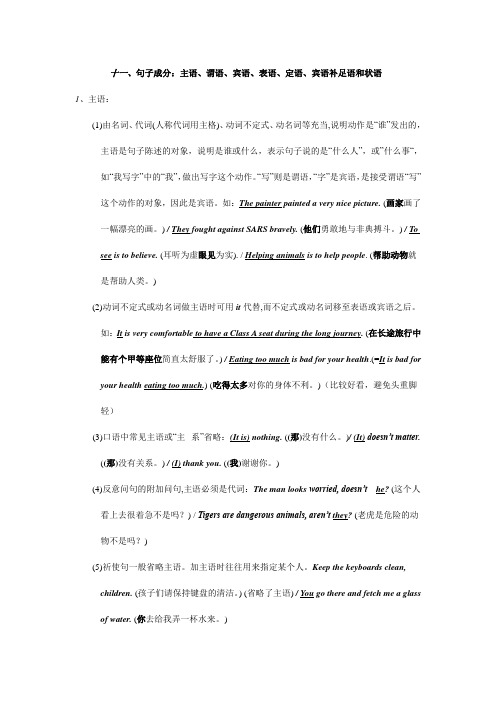
十一、句子成分:主语、谓语、宾语、表语、定语、宾语补足语和状语1、主语:(1)由名词、代词(人称代词用主格)、动词不定式、动名词等充当,说明动作是“谁”发出的,主语是句子陈述的对象,说明是谁或什么,表示句子说的是“什么人”,或”什么事“,如“我写字”中的“我”,做出写字这个动作。
“写”则是谓语,“字”是宾语,是接受谓语“写”这个动作的对象,因此是宾语。
如:The painter painted a very nice picture. (画家画了一幅漂亮的画。
) / They fought against SARS bravely. (他们勇敢地与非典搏斗。
) / To see is to believe. (耳听为虚眼见为实). / Helping animals is to help people. (帮助动物就是帮助人类。
)(2)动词不定式或动名词做主语时可用it代替,而不定式或动名词移至表语或宾语之后。
如:It is very comfortable to have a Class A seat during the long journey. (在长途旅行中能有个甲等座位简直太舒服了。
) / Eating too much is bad for your health.(=It is bad for your health eating too much.) (吃得太多对你的身体不利。
)(比较好看,避免头重脚轻)(3)口语中常见主语或“主--系”省略:(It is) nothing. ((那)没有什么。
)/ (It) doesn’t matter.((那)没有关系。
) / (I) thank you. ((我)谢谢你。
)(4)反意问句的附加问句,主语必须是代词:The man looks worried, doesn’t he? (这个人看上去很着急不是吗?) / Tigers are dangerous animals, aren’t they? (老虎是危险的动物不是吗?)(5)祈使句一般省略主语。
在英语中什么是主语、谓语、宾语、状语、表语、定语、补语、宾补_的位置

┃2. The dinner │smells│good. ┃
┃3. He │fell│in love.┃
┃4. Everything │looks │different.┃
┃5. He │is growing│tall and strong.┃
┃6. The trouble│is│that they are short of money. ┃
2、谓语
谓语说明主语的动作,状态或特征。
一般可分为两类:
1),简单谓语
由动词(或短语动词)构成。
可以有不同的时态,语态和语气。
Westud'yforthepeo'ple.我们为人民学习。
2),复合谓语:情态动词+不定式
Icanspeakalit'tleEng'lish.我可以说一点英语。
Thebikeintheroomismine.房间里的自行车是我的。
6、状语
修饰动词,形容词,副词以及全句的句子成分,叫做状语。用作状语的通常是副词,介词短语,不定式和从句等。状语一般放在被修饰的词之后或放在句尾。副词作状语时可放在被修饰的词前或句首。
HelivesinLon'don.他住在伦敦。
┠————┼—————┼———————┼————————————┨
1. She│ordered │herself │a new dress.┃
┃2. She│cooked│her husband │a delicious meal. ┃
┃3. He │brought │you │a dictionary. ┃
8.宾补
就是宾语补足语,就是补充说明宾语的
英语语法基础知识大全笔记
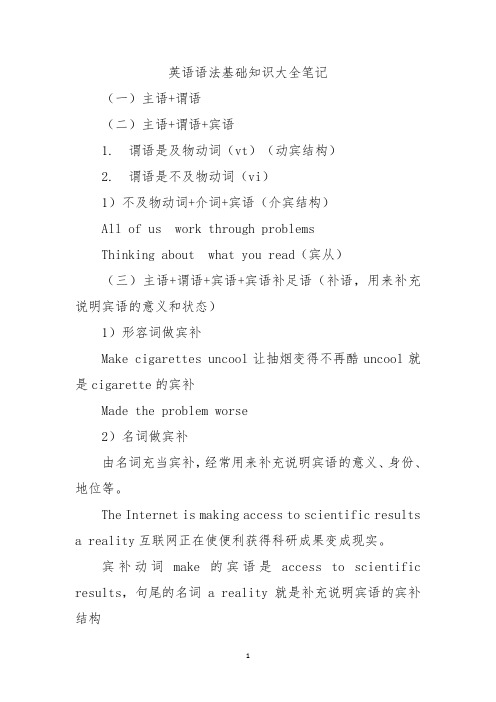
英语语法基础知识大全笔记(一)主语+谓语(二)主语+谓语+宾语1. 谓语是及物动词(vt)(动宾结构)2. 谓语是不及物动词(vi)1)不及物动词+介词+宾语(介宾结构)All of us work through problemsThinking about what you read(宾从)(三)主语+谓语+宾语+宾语补足语(补语,用来补充说明宾语的意义和状态)1)形容词做宾补Make cigarettes uncool让抽烟变得不再酷uncool就是cigarette的宾补Made the problem worse2)名词做宾补由名词充当宾补,经常用来补充说明宾语的意义、身份、地位等。
The Internet is making access to scientific results a reality互联网正在使便利获得科研成果变成现实。
宾补动词make的宾语是access to scientific results,句尾的名词a reality就是补充说明宾语的宾补结构3)动词做宾补以动词原形、不带to的不定式和分词结构为主Make the site seem objective 使网站看起来公正客观宾补动词make后面的宾补为动词seem,这就是我们常说的make+某人/某物+动词原形,表示使某人/某物...He hesitanted make his discovery known将自己的发现公之于众犹豫不决To see a woman driving4)常见的宾补动词A. 宾补常为形容词的动词:make,render,find,drive,get等+adj。
B. 宾补常为形容词的动词:make,appoint,elect,crown等+n5)宾语后置当宾语是一个较为复杂的动词不定式结构或者是一个从句时,为了保持句子平衡,习惯上会将宾语后置,会用it 来冲当形式宾语。
The financial crisis has made it more acceptable to be between jobs or to leave a bad one 金融危机使得工作还是辞退不好的工作变得更容易接受谓语是make,宾语为to be between jobs or to leave a bad one,但由于宾语较长后面还加上more acceptable 的宾补,考虑到句子平衡所以后置了宾语。
主谓宾宾补结构的句子

主谓宾宾补结构的句子主谓宾宾补结构是英语句子中的一种常见句式,它由主语、及物动词、宾语和宾语补足语组成。
在这种句式中,宾语补足语通常是形容词、名词、不定式或从句等。
主谓宾宾补结构的使用可以丰富句子结构,使句子表达更加准确、生动和丰富。
接下来,我们将详细介绍主谓宾宾补结构的各种形式及其用法。
首先,主谓宾宾补结构中的宾语补足语可以是形容词。
比如,在句子“I find the movie very interesting.”中,“I”是主语,“find”是及物动词,“the movie”是宾语,“very interesting”是宾语补足语,用来修饰宾语“the movie”,使句子更加生动。
其次,宾语补足语也可以是名词。
比如,在句子“Heconsiders her his best friend.”中,“He”是主语,“considers”是及物动词,“her”是宾语,“his best friend”是宾语补足语,用来说明宾语“her”的身份,起到补充说明的作用。
此外,宾语补足语还可以是不定式。
比如,在句子“She wants to become a doctor.”中,“She”是主语,“wants”是及物动词,“to become a doctor”是宾语补足语,用来说明主语“She”想要实现的愿望,起到补充说明的作用。
最后,宾语补足语也可以是从句。
比如,在句子“We believe that he is innocent.”中,“We”是主语,“believe”是及物动词,“that he is innocent”是宾语补足语,用来说明主语“We”相信的内容,起到补充说明的作用。
总之,主谓宾宾补结构在英语句子中起着非常重要的作用,通过不同形式的宾语补足语,可以使句子更加丰富多彩,表达更加准确清晰。
在写作和口语表达中,我们可以灵活运用主谓宾宾补结构,使句子更加生动有趣,给人留下深刻的印象。
希望本文的介绍能够帮助大家更好地理解和运用主谓宾宾补结构,提高英语表达能力。
主语谓语宾语宾语补足语

主语谓语宾语宾语补足语
主语谓语宾语宾语补足语是英语语法中的重要概念,它们在句子中起着不可或缺的作用。
主语通常是句子中的主要实体或动作的执行者,谓语表示主语的动作或状态,宾语是动作的承受者或受益者,而宾语补足语则用来补充宾语的信息。
下面将分别对这些要素进行详细解释。
首先,主语是句子中的核心成分,它通常是名词或代词。
主语的作用是指出句子中的主要实体或动作的执行者。
例如,在句子“Tom is a teacher.”中,主语是“Tom”,表示“汤姆”。
其次,谓语是句子中的核心成分,它通常是动词。
谓语的作用是表示主语的动作或状态。
例如,在句子“Tom is a teacher.”中,谓语是“is”,表示“是”。
然后,宾语是句子中的一个重要成分,它通常是名词、代词或名词性短语。
宾语的作用是指出动作的承受者或受益者。
例如,在句子
“Tom teaches English.”中,宾语是“English”,表示“英语”。
最后,宾语补足语用来补充宾语的信息,通常是形容词、名词、副词或介词短语。
它的作用是对宾语进行补充说明或限定。
例如,在句子“Tom found the book interesting.”中,宾语是“the book”,而宾语补足语是“interesting”,表示“有趣的”。
综上所述,主语谓语宾语宾语补足语是构成句子的重要要素,它们共同协作,使得句子在语法和语义上都能够表达清晰准确的意思。
掌握好这些概念,能够帮助我们更好地理解和运用英语语法,从而提高我们的写作能力和沟通技巧。
英语句子成分主语谓语宾语表语定语状语补语同位语讲解

英语主谓宾表定状补成分精简讲解一.主语:主语(subject) 是一个句子的主题( theme),是句子所述说的主体。
它的位置一般在一句之首。
可用作主语的有单词、短语、从句乃至句子。
1.名词作主语。
A tree has fallen across the road. (倒下横在)Little streams feed big rivers. ( 小河流入大江。
)2.代词用作主语。
You’re not far wrong. (你差不多对了)。
He told a joke but it fell flat. (他说了个笑话,但没有引人发笑)3.数词用作主语。
Three is enough. 三个就够了。
Four from seven leaves three. 7减4余3。
4.名词化的形容词用作主语。
The idle are forced to work. 懒汉被迫劳动。
Old and young marched side by side. 老少并肩而行。
5.副词用作主语。
Now is the time. 现在是时候了。
Carefully does it. 小心就行。
6.名词化的介词作主语。
The ups and downs of life must be taken as they come.7.不定式用作主语。
To find your way can be a problem.你能否找到路可能是一个问题。
It would be nice to see him again.8.动名词用作主语。
Smoking is bad for you. Watching a film is pleasure,but making one is hard work.9.名词化的过去分词用作主语。
The disabled are to receive more money. The deceased died of old age.10.介词短语用作主语。
中考英语 主语 谓语 宾语 定语 状语 补语和表语

中考英语主语谓语宾语定语状语补语和表语
中考英语:
主语:主要指语句中的动作执行者,可以是人、物、抽象概念等,一般放在句首。
谓语:即动词,表示动作、状态或存在。
宾语:动作、状态的接受者,一般位于谓语动词之后,可以单独成句,也可以与谓语动词一起组成谓宾结构。
定语:限定、修饰名词或代词的词组、形容词或分词,其所修饰的名词或代词叫作先行词。
状语:表示发生的时间、地点、原因、条件、方式、程度等的词或词组,可以位于句首、句中或句末。
补语:表示谓语动词意义的实词,如名词、宾语补足语等,例如:He gave me a book(他给了我一本书),give是谓语动词,book是宾语补足语。
表语:表示主语性质、状态等的定语、副词或分词,一般位于主语之后,常用来表示陈述句的语气。
例如:He is a teacher(他是老师),teacher是表语。
- 1 -。
宾补的结构

宾补的结构宾语补足语(Object Complement,简称宾补)是英语句法中的一个重要组成部分。
它出现在某些及物动词后面,用来对宾语进行补充说明,表达宾语的动作、状态、特征或身份等。
宾补结构的基本形式如下:主语 + 谓语动词(及物动词) + 宾语 + 宾语补足语例如:1. 名词作宾补:I consider him my friend . (我认为他是我的朋友)主语:I谓语动词:consider宾语:him宾语补足语:my friend2. 形容词作宾补:She found the room empty . (她发现房间是空的)主语:She谓语动词:found宾语:the room宾语补足语:empty3. 副词作宾补:He left the door open . (他让门开着)主语:He谓语动词:left宾语:the door宾语补足语:open4. 不定式作宾补:We want you to come with us. (我们希望你和我们一起来)主语:We谓语动词:want宾语:you宾语补足语:to come5. 现在分词作宾补:The news made her excited . (这个消息使她感到兴奋)主语:The news谓语动词:made宾语:her宾语补足语:excited6. 过去分词作宾补:They considered him a genius . (他们认为他是天才)主语:They谓语动词:considered宾语:him宾语补足语:a genius7. 介词短语作宾补:I saw a man in the park . (我看见一个人在公园里)主语:I谓语动词:saw宾语:a man宾语补足语:in the park。
英语语法主谓宾定状补讲解

英语语法主谓宾定状补讲解在英语语法中,主谓宾定状补是一种常见的句子结构。
它是由以下几个要素组成:1. 主语(Subject):执行动作或承受动作的人或物。
2. 谓语动词(Verb):表示主语动作或状态的词。
3. 宾语(Object):动作的接受者或影响对象。
4. 定语(Adjective):用于描述或限定名词或代词的词语。
5. 状语(Adverb):修饰动词、形容词或副词的词语。
6. 补语(Complement):用来补充、说明或限制主语或宾语的成分。
下面是对主谓宾定状补的讲解:主谓宾定状补的基本结构是:“主语+ 谓语动词+ 宾语+ 定语+ 状语”。
1. 主语(Subject):是执行动作或承受动作的人或物,通常是句子的主要名词或代词。
- 例如:Peter, The cat, They2. 谓语动词(Verb):表示主语动作或状态的词,通常是句子的核心。
- 例如:is, eat, play, run3. 宾语(Object):动作的接受者或影响对象,是受动作影响的名词或代词。
- 例如:an apple, the game, music4. 定语(Adjective):用于描述或限定名词或代词的词语。
- 例如:beautiful, red, tall5. 状语(Adverb):修饰动词、形容词或副词的词语。
- 例如:quickly, very, well6. 补语(Complement):用来补充、说明或限制主语或宾语的成分。
- 例如:happy, a doctor, a teacher例句:1. She (主语) is (谓语) a teacher (定语).2. They (主语) eat (谓语) an apple (宾语).3. The cat (主语) is (谓语) very cute (定语).4. He (主语) plays (谓语) the guitar (宾语) well (状语).5. I (主语) am (谓语) happy (补语).在这些例句中,主语是句子的主要名词或代词,谓语动词表示主语的动作或状态,宾语表示动作的接受者或影响对象,定语用于描述或限定名词或代词,状语修饰动词、形容词或副词,而补语用来补充、说明或限制主语或宾语。
英语主谓宾语法结构

英语主谓宾语法结构
英语中的主谓宾语结构是句子的基本组成部分之一,它通常由
主语、谓语和宾语组成。
主语是句子中的主要名词或代词,它通常
是动作的执行者或者是句子中的主要话题。
谓语是动词或动词短语,表示主语的动作、状态或属性。
而宾语是动作的接受者或者是受到
动作影响的对象,它可以是名词、代词或者是从句。
在英语句子中,主谓宾语结构通常遵循以下几种形式:
1. 主语 + 及物动词 + 宾语。
例如,She (主语) reads (谓语) a book (宾语)。
2. 主语 + 系动词 + 宾语补语。
例如,He (主语) is (系动词) a doctor (宾语补语)。
3. 主语 + 及物动词 + 间接宾语 + 直接宾语。
例如,She (主语) gave (及物动词) me (间接宾语) a
present (直接宾语)。
4. 主语 + 及物动词 + 宾语 + 宾语补语。
例如,They (主语) made (及物动词) him (宾语) their leader (宾语补语)。
这些是主谓宾语结构的基本形式,但在实际运用中,还有一些特殊情况需要注意,比如及物动词后面可以跟宾语从句等。
总的来说,主谓宾语结构是英语句子中非常重要的一部分,掌握好这种结构对于理解和运用英语是至关重要的。
- 1、下载文档前请自行甄别文档内容的完整性,平台不提供额外的编辑、内容补充、找答案等附加服务。
- 2、"仅部分预览"的文档,不可在线预览部分如存在完整性等问题,可反馈申请退款(可完整预览的文档不适用该条件!)。
- 3、如文档侵犯您的权益,请联系客服反馈,我们会尽快为您处理(人工客服工作时间:9:00-18:30)。
8. 我们必须保持身体健康。(in good condition) We must keep our health in good condition.
9. 我们不会让她在晚上外出的。 We won‘t have her go out at night.
13. 我想乘船去那里更舒服些。 13. I think it more comfortable to go there by ship.
14. 学校定了一条规则, 开始上课时学 生要起立。(make) 14. The schools made it a rule that students should stand up at the beginning of the class.
本句型中的动词虽然是及物动词,但是只 跟宾语还不能表达完整的意思,必须加上一个 补充成分,如形容词、名词、副词(仅限少数 几个)、动词不定式、分词来补充说明宾语, 才能表达一个完整的意思。宾语和宾语补足 语在意义有一种逻辑上的主谓关系,即宾语与 宾语补足语在“意义上”是一种主谓关系。 如:
We elected Li Ming our monitor. 我们 选李阳做我们的班长。(Li Ming is our monitor)
10. 他每个月理一次发。 He has his hair cut once a month.
11. 我从来没看见这个字这样用过。 1 used in this way.
12. 他感到很难跟你交谈。 12. He feels it hard to talk with you.
⑶ He believed it unlikely that she would agree. 他相信她不可能同意。
【说明】
⑴ 当作宾语的不定式、动名词、宾语从句跟 一个补足语时, 要用形式宾语it放在宾语的位
置,将真正的宾语放到后面。
⑵ 用doing作真正的宾语时, 其补足语通常 是useless, senseless, no use, good, sense, point等, 表示“无益或没有意义”。 ⑶ 能用于该句型的谓语动词有consider, believe, feel, find, make, think, suppose等。
2. 主语+及物动词+宾语+形容词 如: The news made me happy. 那消息 使我很高兴。
常用于此句型的动词有:make, paint, dye, get (ready), cut (short), set (free), keep, drive (mad), find, want, hold (responsible), wish, like, see, imagine, turn, beat (black and blue), boil (hard), suppose, prove, think, believe, consider, leave等。
The news made us sad. 这新闻使我伤 心。(We were sad)
根据宾补的不同可分为以下几种情况: 1. 主语+及物动词+宾语+名词。如: President appointed John manager of Marketing. 总裁任命约翰为营销部经理。
常用于此句型的动词有:call, name, make, elect, appoint, nominate (提名), crown, think, consider, leave等。
3. 主语+及物动词+宾语+介词短语。如: I found myself in dark. 我发现自己还蒙 在鼓里。
4. 主语+及物动词+宾语+不定式。如: He encouraged her to work harder. 他鼓 励他努力工作。
要求用to do作宾补的动词有: advise, allow, ask, beg, cause, choose, encourage, expect, force, get, invite, order, permit, persuade, request, tell, want, warn, wish 等。
即时练习:请用“主语+及物动词+宾 语+宾补”句型翻译下列句子。 1. 那噪音快要使我发疯了。 1. The noise is driving me crazy.
2. 我们要使学校变得更美丽。 2. We must make our school more beautiful.
3. 他请我们参加做游戏。 3. He asked us to join in the game.
4. 我要你把真相告诉我。 4. I want you to tell me the truth.
5. 明天我要找人来修理机器。 5. I will have the machine repaired tomorrow.
6. 每天早晨我们都听到他大声朗读英语。 6. We hear him reading English aloud every morning.
He always has others wait for him. 他总 是要别人等他。
要求用do作宾补的动词有: 使役动词 let, make, have等; 感官动词observe, feel, hear, listen to, look at, notice, see, watch等。
【注意】
6. 主语 + 谓语 + it + 宾补 + 真正宾
语。如:
⑴ I found it very pleasant to be with your family. 我觉得与你家人
相处令人愉快。
⑵ She thinks it no point practicing so much. 她认为练习这么多没有意义。
若变为被动语态, 其后的宾语补足语就成 为主语补足语了, 此时作主语补足语的不定式
要带to。如: The boss made him work overtime.(主动 语态)
He was made to work overtime.(被动语态)
老板叫他加班。
5. 主语+及物动词+宾语+分词。如: Don’t leave the water running after you have washed your hands. 洗手之后不要 听任水白流。
15. 我认为与那个人谈话是无益的。 15. I believe it no use talking with that man.
I heard my name called. 我听到有人叫 我的名字。
【注意】
现在分词为宾语补足语时, 宾语与 现在分词之间是主动关系; 过去分词为 宾语补足语时, 宾语与过去分词之间是 被动关系。常用于此句型的动词有:
catch, feel, find, get, have, hear, keep, leave, listen to, look at, notice, observe, see, set, smell, watch等。
